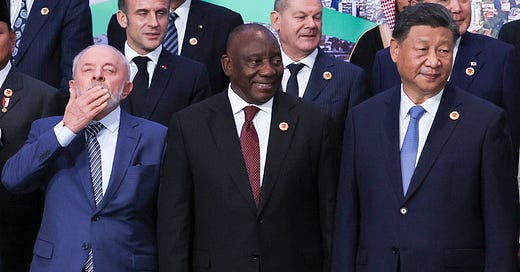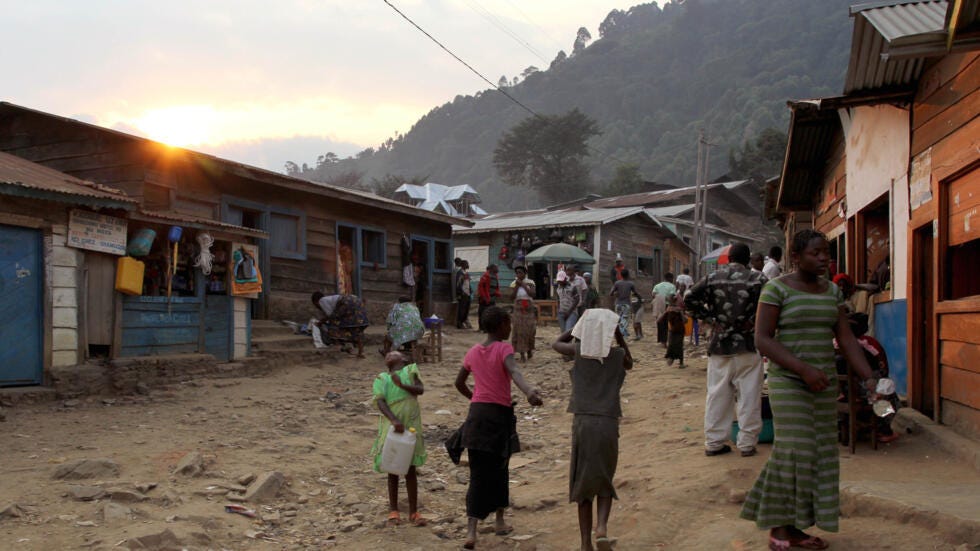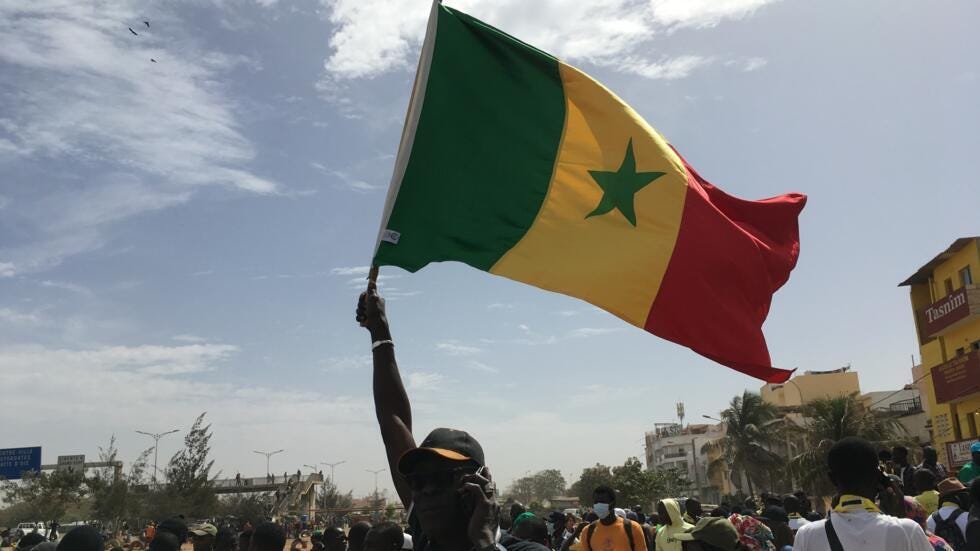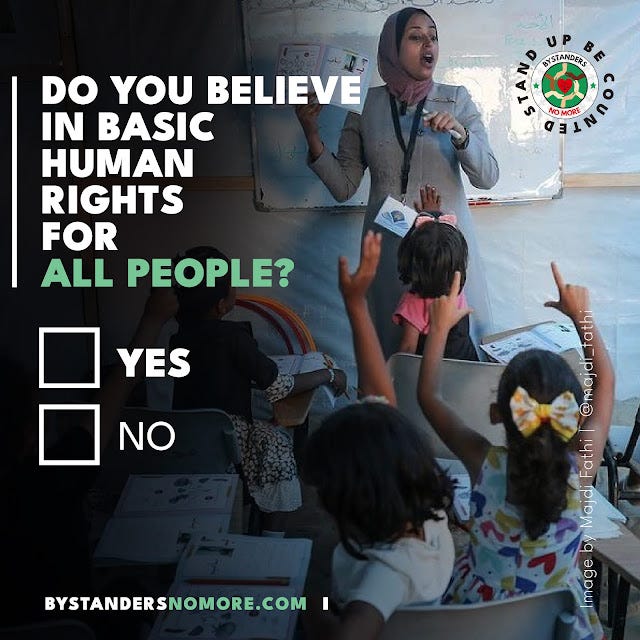Some unmissable stories as we start 2025
This year, South Africa presides the G20 (uniting the 19 strongest world economies + the EU & AU). Meanwhile, in the Congo, the backstory of our mineral-based tech-obsessed society takes a turn...
Hello dear readers,
This week a Trump-free, worldly round-up with some stories bound to mark 2025!
What’s not to like?
G20: A new platform for world affairs?
The G20 was set up in 1999 to create a platform for the world's most dynamic economies beyond the G7.
The forum unites 19 of the world's largest economies plus the European Union, who meet regularly to coordinate global policies on trade, health, climate and other issues. The group granted the African Union membership in 2023.
The countries: Argentina, Australia, Brazil, Canada, China, France, Germany, India, Indonesia, Italy, Japan, Republic of Korea, Mexico, Russia, Saudi Arabia, South Africa, Turkey, the United Kingdom, and the United States.
As South Africa leads its presidency this year, an it change our world affairs?
South Africa leads the G20 for a year, promising a stronger voice for the Global South
GLOBAL RELATIONS
Africa takes centre stage as South Africa maps ambitious G20 agenda
As the first African country to lead the trillion-dollar G20 group, South Africa will spend 2025 pushing debt relief, climate change and international justice issues. This means there's a lot at stake for Brics and developing nations.
By: Melissa Chemam
"We will work towards solidarity, equality and sustainable development that will have an impact on many people around the world," President Cyril Ramaphosa said in his New Year address last night.
"Every South African will be part of the journey towards a better future for all."
Pretoria aims to put African development priorities firmly on the G20 agenda – and more broadly, those of the Global South.
South Africa took over the rotating presidency of the grouping in December, and will host its main annual summit in November 2025, before handing over to the United States.
Read the whole story here: Africa takes centre stage as South Africa maps ambitious G20 agenda
2025: A year of major shifts in international relations…?
Isn’t this already happening?
As the year is also the one of the 80th anniversary of the end of World World II, leaders in the Global South want change in international institution. This starts with a different form of dialogue, and conversation with the north…
An example:
African diplomacy
Senegal and Chad rebuke Macron over 'inaccurate' French troop withdrawal claims
The Senegalese prime minister and the Chadian foreign minister have condemned claims made by Emmanuel Macron regarding negotiations about the withdrawal of French troops from several African countries, dismissing them as inaccurate.
Issued on: 07/01/2025
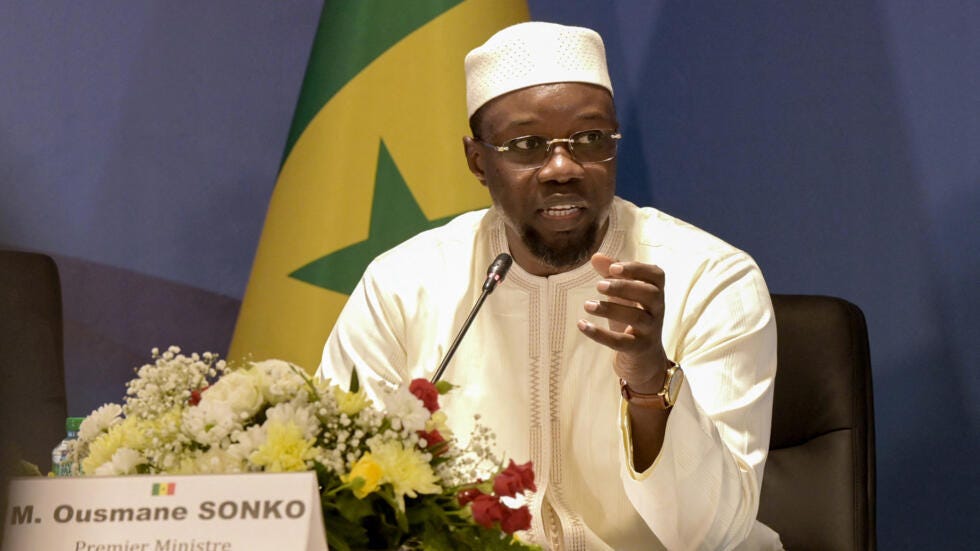
By: Melissa Chemam
The Senegalese Prime Minister and the Chadian Foreign Minister have condemned claims coming from Emmanuel Macron that negotiations had taken place regarding the announced withdrawal of French troops from several African countries, denying their accuracy.
French President Emmanuel Macron said during his discours that the announced withdrawal of French military bases had been negotiated between the African countries involved and France. He claimed it was purely out of convenience and politeness that France allowed these African nations to make the announcement first.
The remarks were made at the annual conference of ambassadors held this year on 6 and 7 January in Paris.
However, Senegalese Prime Minister Ousmane Sonko criticised Macron's remarks as "completely inaccurate," while Chadian Foreign Minister Abderaman Koulamallah described them as disdainful…
Diplomatic mistakes
The French president's African policy looks less and less readable, according to African affairs expert Antoine Glaser.
"Macron is making a serious effort to wipe the slate clean..." he told RFI, "across the entirety of French-speaking post-colonial Africa, with a desire to shift focus towards Nigeria and English-speaking countries in general. He has visited Ethiopia and South Africa."
According to Glaser, Macron seeks to demonstrate that he still holds influence over Africa's future. However, Chad and Senegal have forged new strategic and financial partnerships, particularly with the United Arab Emirates, as well as with countries in Asia and the broader Middle East.
Read further from here: Senegal and Chad rebuke Macron over 'inaccurate' French troop withdrawal claims
Putting an end to the traffic of ‘blood minerals’?
As the DRC brings an unprecedented case against the American tech giant, the company offers assurances that it will no longer use conflict minerals from central Africa, but experts are questioning whether real change is on the horizon in illegal mining on not...
PODCAST
DRC takes on Apple: can conflict mineral mining be stopped?
Issued on: 08/01/2025
The Democratic Republic of Congo is launching an unprecedented case against the American tech giant Apple over conflict minerals. To explore the issues at hand, RFI talked to a former UN expert to discuss whether any progress has been made in curbing illegal mining.
To examine the implications of this trial, this week's guest is Gregory Mthembu-Salter, a researcher specialising in Africa's political economy and a former consultant to the UN Group of Experts on the DRC on due diligence regarding conflict minerals. He is based in South Africa.
To listen: DRC takes on Apple: can conflict mineral mining be stopped?
For all the details- read:
DRC case against Apple brings new hope in conflict minerals crisis
Issued on: 03/01/2025
By: Melissa Chemam
The war over so-called "conflict minerals" is more than two decades old, but the fight to prevent their exploitation by global tech companies is much newer.
In the Democratic Republic of the Congo (DRC), various armed groups – including both Congolese army and rival armed rebel groups, among them the M23 – occupy mines and trading routes, forcing miners to work for free.
Minerals from these mines, including tungsten, tin and tantalum (often referred to as the 3Ts), have been illegally smuggled through Rwanda for several years, and eventually exported to tech companies such as Apple, Tesla and Samsung.
But after the DRC filed criminal charges against Apple over the use of conflict minerals, there is renewed hope that this illegal mining could be brought to an end.
Democracy
Who were the winners and losers of African democracy in 2024?
In 2024, 18 elections took place on the African continent, from Senegal to South Africa, Algeria to Ghana, with the results an equal mix of democratic success stories and challenges still to overcome.
Issued on: 04/01/2025
By: Melissa Chemam
In a historic year for democracy – with elections taking place in more than 50 countries around the world in 2024, bringing more than 1.5 billion people to the polls – the African continent was no exception.
With 18 elections taking place, including Senegal's in March, South Africa's in May, Algeria's and Tunisia's in September and October respectively, and Ghana's in December, some regions, particularly in West Africa, saw significant progress through democracy, while others still face significant challenges.
Lessons from West Africa
Political scientist Mathias Hounkpe is the co-author of a comparative analysis of electoral commissions in West Africa, which saw elections in Senegal and Ghana this year.
According to Hounkpe, both set examples of well-run and effective polls.
"In Senegal, the results reflect the ability of the institutions in the countries concerned to perform their roles properly, as well as the citizens’ ability to organise themselves to protect democracy and safeguard the elections," he told RFI.
Having been delayed by former president Macky Sall, the presidential election held in March saw Bassirou Diomaye Faye elected with 54 percent of the vote. The ruling Pastef party then managed a landslide majority in snap parliamentary elections in November.
In Ghana in December, the presidential election marked the return to power of former president John Mahama.
"I believe that Ghana could be an example for the entire sub-region," Hounkpe said. "It is the country where the electoral commission makes significant efforts to earn the trust of the citizens."
He added: "The loser conceded victory based on the results collected by the party itself. They didn't even wait for the provisional results to be announced by the commission. It was based on the results they gathered themselves. So, for me, it’s a lesson for political parties in the sub-region."
Read the rest of the story from here: Who were the winners and losers of African democracy in 2024?
Meanwhile, in North Africa, one big story resonates…
Justice
France's ex-president Sarkozy on trial over alleged Gaddafi pact
Former French president Nicolas Sarkozy is again on trial from this Monday, as he has been charged with accepting illegal campaign financing in an alleged pact with the late Libyan dictator Muammar Gaddafi.
Issued on: 06/01/2025
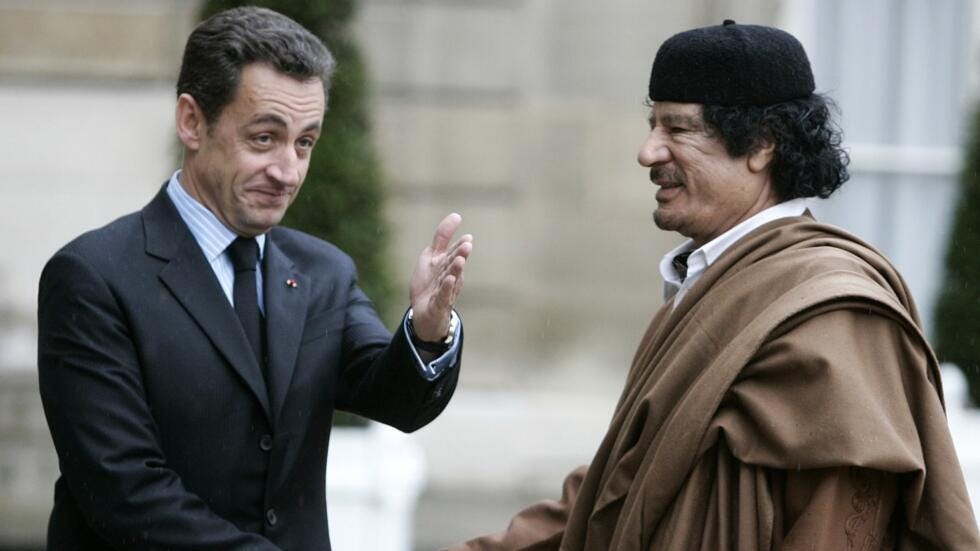
By: Melissa Chemam
Nicolas Sarkozy was present in the Paris court as the trial got underway Monday. He plans to attend the initial phase of hearings, as a source close to him told French news agency AFP, asking not to be named.
The trial centers on whether the former French president received money from the then Libyan leader Muammar Gaddafi to finance the campaign that brought him to the Élysée in 2007, with him and eleven other defendants, including three former ministers - Claude Guéant, Brice Hortefeux, and Éric Woerth - standing trial.
Vincent Brengarth, lawyer for the Sherpa association, a civil party, told RFI that he hopes that despite the longevity and complexity of the case, the public's interest will match the stakes of this trial.
"This case might seem, in some respects, completely fictional if it were not supported by years of thorough investigation," he said.
Libyans between resentment and anger
For Libyans, the question of corruption does not arise. Familiar with the practices of Gaddafi's regime, which provided funds to foreign heads of state, the Libyans are convinced that their country did indeed finance Sarkozy's 2007 presidential campaign.
"For the Libyans, it's as if it belongs to a bygone era," researcher Jalal Harchaoui, a Libya specialist at the Royal United Services Institute, told us.
"They are well aware that Sarkozy played an important role in Libya's fate in 2011. But people are not really hanging on to this particular case. They tend to think that there is not much suspense regarding the final outcome. They are rather disillusioned by this story."
In Libya, many view Sarkozy primarily as the figure responsible for the destruction of the Libyan state and the despair that followed France's military intervention in 2011.
Since then, their living conditions have continued to deteriorate in Libya, where people face corruption, instability, and the devastation caused by militias and constant foreign interventions.
Some voices have been raised, calling for the former occupant of the Élysée to be brought before the International Criminal Court for alleged crimes committed against the Libyan people.
Read on from here: France's ex-president Sarkozy on trial over alleged Gaddafi pact
A few words finally, on Sudan…
US sanctions Sudan's RSF leader over genocide claims but critics say its not enough
The United States has determined that Sudan's Rapid Support Forces (RSF) have "committed genocide" in Sudan and has imposed sanctions on the paramilitary group's leader. While conflict resolution NGOs have welcomed the decision, many organisations and analysts fear that the move may be 'too little, too late.'
The announcement had been expected by many in Sudan and in the humanitarian workers community. But for most of them, it is "too little too late," as Cameron Hudson, a senior fellow at the Centre for Strategic and International Studies in DC, wrote on social media.
"It's too late to fix a failed (non-existent) Sudan policy and it's too late to get on the right side of history," he added.
» Read the story from this link: https://www.rfi.fr/en/africa/20250108-us-sanctions-sudan-s-rsf-leader-over-genocide-claims-but-critics-say-its-not-enough
Finally: an important initiative!
>> Bystanders No More
"Helping people speak up about human rights in Palestine"
If…
✅ You believe in human rights and international law
✅ You care about all people – including Palestinians
✅ You are concerned about the atrocities in Gaza
But…
❌ You worry you’ll be labelled antisemitic or pro-Hamas if you speak out
❌ You think that you (and the public) are powerless in this situation
❌ You don’t feel educated enough to take action
A basic sense of right and wrong is all that is required to stand up now against the collective punishment of civilians. No degree or specialised expertise is necessary, and taking action doesn’t always look like taking to the streets to protest or being outspoken on social media.
Concerned citizens can lobby elected officials to support policies, donate to organisations, join the Boycott, Divestment & Sanctions movement and simply talk to friends and family. Each of us may choose different ways to help stop the atrocities, but we all must do something.
Check their website and how to help:
Bystanders No More
"Helping people speak up about human rights in Palestine"
Thanks for reading, as always.
If you want some more regular world news, with a Global South twist (sometimes daily), you can also read my blog: Melissa On The Road.
And RFI English on Africa.
If this newsletter wants to be less Western-centric, this edition remain very male… It deals with world leadership, so this year is not helping me. I’ll try to do better soon.
With my very best wishes again for the new year…
melissa
-
Melissa Chemam
Journalist & Writer
> Reporter at RFI English
> Podcast: Spotlight on Africa

